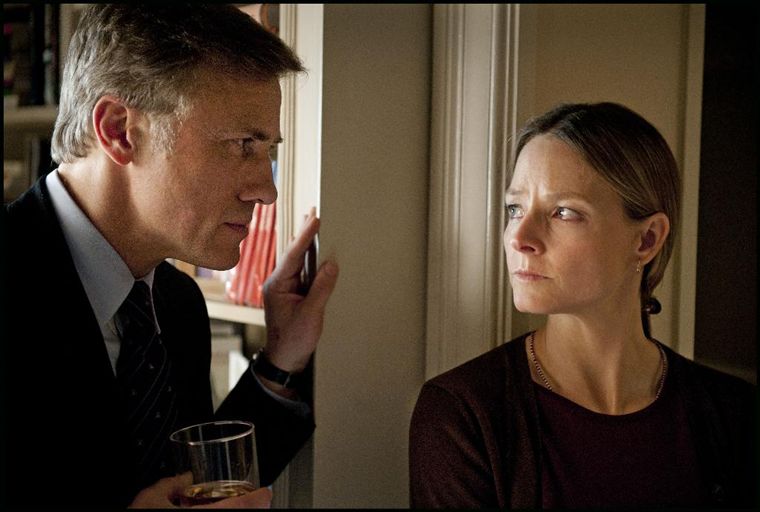|
Carnage
Reviewed
by
Damien Straker on
February 9th, 2012
Sony presents
a film directed by
Roman Polanski
Screenplay
by
Yasmina Reza and Roman Polanski, based on the play
"God of Carnage" by Yasmina Reza
Starring:
Jodie Foster, John C. Reilly, Christoph
Waltz and Kate Winslet
Running
Time:
79 mins
Rating:
M
Released:
March 1st,
2012
|
7/10
|
|
Carnage opens with two young boys having an argument. We can't
hear what
they are saying but we can see that it is erupting, until one of the
boys picks
up a stick and smacks the other one in the mouth. Cutting to the inside
of an
apartment and we see two groups of parents arguing over a letter they
are
writing about the incident. Michael (John C. Reilly) and Penelope
(Jodie
Foster) are the parents of the victim and Alan (Christoph Waltz) and
Nancy (Kate
Winslet) know that their son hit the other child. The course of the
film is spent
in this apartment room with the two groups bickering over who is
responsible but
also philosophising about life and morality itself. Alliances between
the
parents regularly shift and change and the tension is thickened,
particularly
when the discussions are constantly interrupted by Alan answering his
phone.

Take extra note of the opening long shot of the boys
playing and
then arguing at the start of Carnage. They're
framed in the background so that we can't hear what they are saying.
This is a
very smart opening to a highly economical film because it aligns us
with the
parents perspective. Just like them there's distance between us and the
kids.
This lends the film a wonderfully ironic spin because for all of the
arguing
over this short film, it runs just under eighty minutes, there's
nothing that
can be proven or resolved. Instead, director Roman Polanski who has
adapted the
play 'God of Carnage' by Yasmina Reaz, continues to show his interest
in confined
spaces and tension within small areas. Polanski is a holocaust survivor
and
many of his films, including this one, are reflective of deep
psychological
conflict, visualised through claustrophobia. Although there are very
long
stretches of dialogue here, since the film is restricted to one setting
with
just a few extra rooms, I found that a lot of the film was hysterically
funny.
This is because the talented cast are working with material that is
both smart
and witty. You really have to listen to what they are talking about
because it
is not all inane banter. As with all good comedy, the dialogue is
always
purposeful, whether the parents are arguing about the most pedantic
word in a
sentence or their own philosophical values. What's amazing about the
film is
just how much is revealed about the characters in such a small amount
of time. It's
a huge lesson in economical storytelling. We have a sense that both
Michael and
his wife are a middleclass couple, who try to be pleasant and are
seemingly
interested in culture and arts. By contrast, Alan and his wife are all
about
business as he is a lawyer and she's a stockbroker. Alan seems entirely
disinterested in the situation, hilariously answering his phone for
most of the
movie. He even admits at one point: "Our son is a maniac". He is a
total nihilist, recalling the time that he has spent time in the Congo,
so that
a child losing too teeth means little to him.

Also fascinating throughout the film is the way that
alliances
constantly shift and change over its duration. Michael and his wife
appear warm
at first but she's cultured but he's a salesman of toilet accessories.
We also
learn that John had his own gang in school and also removed his
daughters pet hamster
and lied about it too. Maybe he isn't so warm and friendly? Part of the
fun is
when the gender wars start as both he and Alan gang up on their wives,
enjoying
scotch and cigars together. You can imagine the boys ganging up on the
girls in
the playground just like this. Waltz is a master of balancing this
quiet intensity
and menace with a razor sharp comic edge. At one point he has a very
tense
standoff with Reilly, which makes their eventual alliance more
surprising and
funny. Jodi Foster is outstanding too as a woman who is so desperate to
try and
be diplomatic but becomes increasingly hysterical. You can see the
anguish
building right throughout her whole neck. The point of the film is that
adults
can be very much like children and that sometimes the kids just have to
work it
out themselves. We see that in the way they fight but also how they
trash each
other's toys. Something happens to that phone that makes Alan's whole
world
crumble and it's the same with some of Penelope's art books too.
Polanski has
photographed the film very simply and elegantly through a wide lens so
that he
captures the furnishings of the apartment, like the books neatly
stacked on the
shelves and lined up on the coffee table. It is within this stabilised
room
that chaos breaks out. Perhaps concealing the film to a single room is
representative of the way that the adult world can never reach or
resolve the
child's playground. It's a modest little comedy, with big laughs, but I
think
it will test a lot of people with those long verbal stretches. I
enjoyed
the film a lot and was surprised by its class, intelligence and irony
but I
wouldn't want it to be any longer.
|